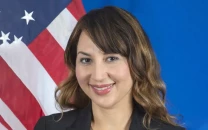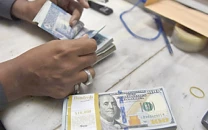Govt to set up digital assets regulatory authority
Body will foster innovation, ensure compliance with global financial norms

In a landmark move to embrace the future of finance, the Ministry of Finance has announced the initiation of a comprehensive strategy to regulate digital assets and accelerate the growth of Pakistan's virtual asset economy.
According to a statement issued by the ministry on Wednesday, the government has endorsed the establishment of a dedicated body — the Pakistan Digital Assets Authority (PDAA) — to regulate blockchain-based financial infrastructure.
"The aim is to ensure FATF-compliant innovation, economic inclusion and responsible adoption of digital assets," it added.
The PDAA will serve as a specialised regulatory body with a clear mandate to oversee licensing, compliance and innovation within the digital asset ecosystem. Besides, it will regulate exchanges, custodians, wallets, tokenized platforms, stable coins and DeFi applications — all under a single, agile framework.
This decision aligns Pakistan with other forward-thinking economies such as the UAE, Japan, Singapore and Hong Kong — all of which have established digital asset regulators to foster innovation while ensuring compliance with global financial norms.
The PDAA is expected to regulate a $25 billion plus informal crypto market, besides enabling the tokenization of national assets and government debt, as well as provide legal clarity to global and local investors, facilitate the monetisation of Pakistan's surplus electricity through the regulated bitcoin mining and empower youth and startups to build blockchain-based solutions at scale.
With the proposed PDAA, Pakistan is signalling its intent to become a competitive player in the global digital economy, inviting responsible innovation and building trust with investors, entrepreneurs and international partners.
"Pakistan must regulate not just to catch up, but to lead. With the PDAA, we are creating a future-ready framework that protects consumers, invites global investment and puts Pakistan at the forefront of financial innovation," remarked Minister for Finance and Pakistan Crypto Council Chairman Muhammad Aurangzeb.
"This is not just about crypto; it's about rewriting our financial future, expanding access and creating new export channels through tokenization, digital finance and Web3 innovation," said Pakistan Crypto Council CEO Bilal Bin Saqib.
Netherlands envoy briefed on economic outlook
Muhammad Aurangzeb also met Netherlands Ambassador Henny de Vries where he highlighted Pakistan's macroeconomic outlook and the government's reform agenda, with particular focus on key sectors of the economy.
Both sides discussed matters of mutual interest and avenues for further strengthening bilateral economic cooperation.
The finance minister underlined the government's commitment to achieving sustainable, productivity-driven and export-led growth and the critical role of private sector as the real engine of economic development.
He acknowledged the technical and financial support provided by the Netherlands in various areas, including development and capacity-building initiatives. He also welcomed the continued interest and investment by Dutch companies in Pakistan and reaffirmed the government's commitment to facilitating foreign investment and fostering a favourable business environment.
The ambassador expressed appreciation for the government's macroeconomic reforms and its focus on export-oriented policies. She reaffirmed the Netherlands' support for Pakistan's economic development and its interest in deepening economic ties and cooperation across diverse sectors.





















COMMENTS
Comments are moderated and generally will be posted if they are on-topic and not abusive.
For more information, please see our Comments FAQ